10 Body Parts Affected by Psoriasis
Psoriasis is a chronic and persistent inflammatory skin condition that can affect various parts of the body. This article will explore ten body parts that can be impacted by this condition.
Psoriasis, a relentless and long-lasting inflammatory skin disorder, is a condition that can manifest anywhere on your body, leaving a trail of discomfort and often, self-consciousness. This particular ailment can be a silent battle for many, affecting not only their physical well-being but also casting a shadow on their mental health. This article aims to delve into the intricate details of psoriasis, shedding light on how it can impact ten specific areas of the human body. The purpose of our discussion is not merely to provide information but also to empower you with knowledge, enabling you to recognize symptoms early on, seek appropriate medical attention, and perhaps, demystify any misconceptions you might have about this skin condition.

We also hope that this article will serve as a tool to enhance understanding and empathy towards those who live with psoriasis, fostering a more inclusive and sensitive society. So, whether you're someone who's been living with psoriasis, a concerned loved one, or simply a curious reader, this deep dive into the ten body parts affected by this persistent condition promises insightful revelations.
Our exploration will not only expand your understanding of the condition but also reveal how these afflicted areas can experience relief and healing. By the end of this informative journey, you'll be equipped with a broader perspective on psoriasis, its impact, and the ways in which it can be managed.
Psoriasis of the Scalp
Scalp psoriasis manifests as red, itchy patches on the scalp and can even extend to the forehead, back of the neck, or behind the ears. Besides the physical discomfort, this can also cause embarrassment due to visible flaking.
Scalp psoriasis typically presents itself in the form of red, itchy patches that inhabit the scalp, creating an environment of discomfort for the person affected. This condition is not just isolated to the scalp, but it can also extend its reach to areas such as the forehead, the nape of the neck, or even subtly creep behind the ears. The affected skin areas often undergo a cycle of flaking and healing that can be quite disconcerting. However, the impact of scalp psoriasis extends beyond the physical realm. Besides the incessant itchiness and the perpetual discomfort, this skin condition can also usher in a wave of embarrassment. Imagine having to constantly worry about visible flaking, akin to a snowfall, from your scalp.
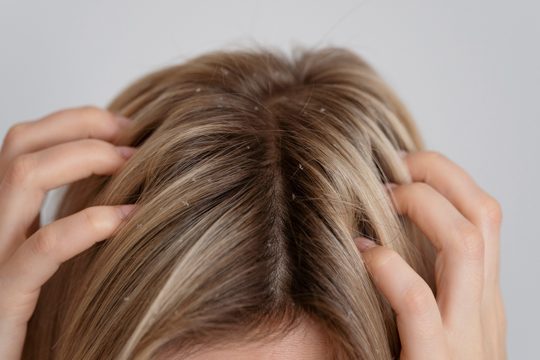
It’s not just about the aesthetic aspect, but it also brings a feeling of self-consciousness that can affect one's social interactions and overall confidence. In essence, scalp psoriasis is not just a mere skin condition; it is a complex medical issue that intertwines physical discomfort with psychological distress.
It's not just about managing the physical symptoms but also about navigating through the emotional labyrinth that comes with it. It is crucial, therefore, to seek timely advice and treatment not only to alleviate the physical discomfort but also to address the emotional distress that it may cause. So, do not let this condition control your life. Remember, you are more than your condition and with the right help, you can manage it effectively.
Psoriasis of the Face
Facial psoriasis, though less common, can appear on the eyebrows, skin between the nose and upper lip, upper forehead and the hairline. It can cause significant emotional distress due to its highly visible nature.
Facial psoriasis, though less widespread than other forms, can manifest itself in various areas on the face. These areas can include the eyebrows, the delicate skin situated between the nose and upper lip, the upper forehead, and along the hairline. It is a condition that doesn't discriminate, affecting these areas indiscriminately. Not only can it be physically uncomfortable, but facial psoriasis can also lead to significant emotional distress due to its highly visible nature. It is something that is hard to hide, making the person feel self-conscious and anxious about their appearance. Moreover, this form of psoriasis is particularly challenging due to the sensitive nature of facial skin.
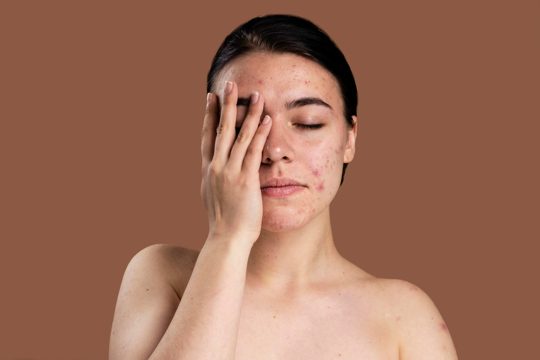
It demands careful, specialized treatment as the skin on the face tends to be thinner and more susceptible to harsh treatments that might otherwise work on the body. The visibility of facial psoriasis can often lead to a detrimental impact on mental well-being, with individuals feeling socially isolated or stigmatized.
However, with the right approach and treatment, it can be managed effectively. One should remember that there is an array of support available - from medical professionals to support groups. It's crucial to remember that this condition does not define you or your value. After all, every individual is more than just their outward appearance.
Psoriasis of the Eyelids
Eyelid psoriasis can lead to red, scaly eyelids and can be particularly troublesome as it may cause discomfort and interfere with vision if it extends to the eyelashes. Eyelid psoriasis, a skin condition that can manifest itself on any part of the body, can be especially troublesome when it appears on the eyelids.
This is because it has the potential to not only cause significant discomfort but also interfere considerably with one's vision if it progresses to the eyelashes. Eyelid psoriasis can present itself as an outbreak of red, scaly patches on the eyelids, creating an unsettling appearance that can be a source of self-consciousness for many individuals. In addition to the physical discomfort, the presence of this condition on such a sensitive area of the face can create unnecessary anxiety, further affecting the person's overall well-being. The inflamed, red skin can cause an itching or burning sensation, adding to the discomfort and making day-to-day tasks more challenging.

The flakes of skin can also potentially fall into the eyes, leading to further issues. Moreover, if the condition extends to the eyelashes, it can result in vision problems.
This could range from mild vision impairment as the scaly patches obstruct the field of view, to more severe issues if the flakes come into contact with the eye. The severity of the symptoms can fluctify, and although the condition is not curable, it can be managed with the right treatment and care. In conclusion, eyelid psoriasis is more than just a skin condition, as it can potentially affect a person's vision, overall well-being, and quality of life, making it a particularly troublesome condition to manage and live with.
Psoriasis of the Arms
Psoriasis on the arms often appears on the elbows but can cover any part of the arm. It can cause discomfort, especially when bending the elbows, and may draw attention due to its visible location.
Psoriasis, a chronic skin condition, frequently manifests itself on various parts of the body, including the arms. Particularly, the elbows often become a prime target of this pesky ailment. However, it's important to note that this condition does not limit itself to just one area. Indeed, it can affect any part of the arm, from your shoulders right down to your fingertips. This wide-ranging impact of psoriasis can cause significant discomfort, particularly when performing routine actions such as bending the elbows. The discomfort, however, is not just physical.

Since our arms are often exposed, psoriasis on this part of the body becomes highly visible to those around us. This visibility may lead to self-consciousness or embarrassment, drawing unwanted attention to the individual suffering from the condition.
It's not just a matter of managing the physical symptoms, but also coping with the psychological impact of this visibly striking skin disorder. In conclusion, psoriasis on the arms is a condition that extends beyond mere physical discomfort. It's an affliction that demands attention not only due to its visible location but also because of the substantial impact it can have on an individual's self-esteem and day-to-day life. While it might seem like a small part of your body to be affected, the repercussions are far-reaching, making it crucial to understand and manage this condition effectively.
Psoriasis of the Legs
Similar to the arms, leg psoriasis can be especially troublesome on the knees but can affect any part of the leg. It can cause difficulties with movement and can be a source of embarrassment when wearing shorts or skirts.
Similar to the discomfort experienced with psoriasis on the arms, the manifestation of this skin condition on the legs can be particularly problematic, especially when it emerges around the knee area. However, it's not limited to the knees, it can indeed spread and affect any part of the leg, from the thigh right down to the ankle. This troublesome skin condition, characterized by its inflamed, scaly patches, can cause significant hurdles in terms of movement. It can make daily activities like walking or running, that we often take for granted, an arduous task, if not downright painful. Additionally, leg psoriasis comes with its own set of social challenges. It can be a source of embarrassment for those who love to sport their favorite shorts or elegant skirts.
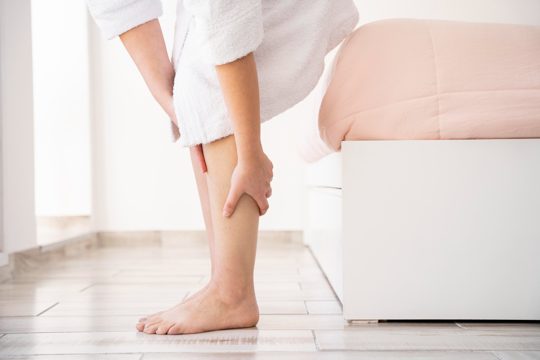
The societal pressure for flawless skin can be overwhelming and the presence of visible psoriasis patches can lead to self-consciousness and a decrease in self-confidence. This can be particularly challenging during warmer months when lighter, more revealing clothing is the norm.
Therefore, while dealing with physical discomfort, individuals with leg psoriasis also often grapple with psychological distress. It's crucial to remember that psoriasis is more than just a skin ailment. It impacts various facets of a person's life, from their mobility to their social interactions, self-esteem, and overall quality of life. The journey towards managing and living with psoriasis can be difficult, but with the right support, understanding, and care, it is certainly manageable.
Psoriasis of the Trunk
Psoriasis can also appear on the trunk, including the chest, back, and stomach. This can cause discomfort and may limit clothing options due to visibility or physical discomfort.
Indeed, psoriasis isn't just confined to the extremities like the arms and legs; it can also manifest on the core parts of the body, or the trunk, which includes areas such as the chest, back, and belly. Not only can this occurrence prove to be inconvenient, but it can also cause a considerable amount of discomfort to the individual. The itching and irritation that are characteristic of psoriasis can be bothersome, and when it's located on the trunk, some daily activities may become a struggle. Moreover, the presence of psoriasis on these parts of the body may force the individual to reconsider their wardrobe choices.

This is due to the fact that the visibility of the condition might make them self-conscious, especially when wearing clothing that exposes the trunk like swimsuits or crop tops. Additionally, certain types of fabric could potentially exacerbate the physical discomfort of the condition, thus further limiting their clothing options.
In conclusion, the manifestation of psoriasis on the trunk of the body can lead to a host of problems, ranging from physical discomfort to psychological distress due to its visibility. It's not just a surface-level skin condition, but a deeper issue that can impact the quality of life of those affected by it.
Psoriasis on the Hands and Feet
When psoriasis affects the hands and feet, it can be very debilitating. It can interfere with daily activities and can cause significant discomfort, especially when walking or using the hands.
When psoriasis, a chronic skin condition, targets the hands and feet, it becomes much more than just an aesthetic concern. It can be exceptionally debilitating. This form of psoriasis can present a profound challenge, as it can dramatically interfere with ordinary daily activities. The things we often take for granted, like walking the dog, typing an email, or even just holding a cup of coffee, can become arduous tasks. The discomfort that psoriasis brings is not just a mere inconvenience, it's a relentless impediment that can have a significant impact on your quality of life. The specific discomfort that psoriasis sufferers experience, particularly when walking or using their hands, can range from mild irritation to severe pain. Imagine feeling a constant prickly sensation or a burning itch every time your feet hit the ground or your hands grasp an object.
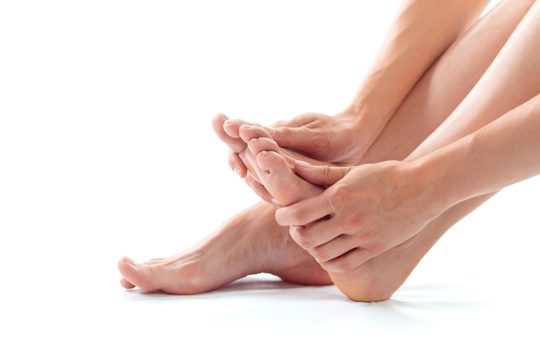
It's a feeling that can be so intrusive, it overshadows everything else. This discomfort can sometimes be so intense that even the simplest tasks seem daunting.
In addition to the physical discomfort, the psychological toll that psoriasis can bring should not be underestimated. The visible symptoms often lead to feelings of self-consciousness, which can affect social interactions and personal relationships. The constant pain and unease can also lead to feelings of frustration, anxiety, and even depression. Therefore, managing psoriasis is not just about treating the physical symptoms, but also addressing the emotional stress it can cause. The battle against psoriasis is fought on multiple fronts, but with the right treatment and support, it is a battle that can be won.
Psoriasis of the Nails
Nail psoriasis can cause the nails to pit, thicken, or separate from the nail bed. It can be painful and can interfere with daily tasks that require fine motor skills.
Nail psoriasis, a chronic and persistent condition, can disorder the normal state of your nails, leading to a variety of symptoms that are both visible and physically discomforting. This particular form of psoriasis can cause your nails to pit or develop small dents, an alteration that not only affects the aesthetics of your nails, but can also become a cause for concern when it comes to your overall nail health. Moreover, nail psoriasis can cause the nails to thicken dramatically, a condition that is far from just a cosmetic nuisance. Thickened nails can be tough to manage and maintain, often leading to discomfort during routine tasks such as typing or opening jars. This thickening can also lead to an increased susceptibility to fungal infections, thereby magnifying the health implications of the condition.

Perhaps the most distressing symptom of nail psoriasis is the nail lifting, also known as onycholysis, where the nail separates from the underlying nail bed. This can be a painful experience, causing significant discomfort, especially when performing daily tasks that require fine motor skills.
Activities that were once taken for granted, like buttoning a shirt or gripping a pen, suddenly become a daunting challenge. In short, nail psoriasis is not just an aesthetic issue, it's a condition that can significantly impair your quality of life, making even the simplest tasks a hurdle. Hence, it's essential to seek timely medical advice and appropriate treatment to manage the symptoms and prevent the condition from worsening.
Psoriasis of the Ears
Ears can also be affected by psoriasis, causing red, scaly patches inside or around the ear. This could potentially lead to hearing problems if not properly managed.
Not only can psoriasis impact the comfort and appearance of your ears, but it can also potentially compromise your hearing ability if left untreated. This condition can manifest as red, scaly patches that appear either inside the ear canal or around the outer ear, creating an uncomfortable and bothersome symptom of this chronic skin disease. Psoriasis in the ears is more than just a cosmetic issue; it's a health concern that requires prompt attention and management. The presence of psoriasis in this delicate area of the body can lead to an accumulation of scales, which may ultimately obstruct the ear canal if not properly managed. Such obstruction could result in temporary or even permanent hearing problems, further complicating the overall impact of psoriasis on one's quality of life.

It's vital to regularly monitor any changes or discomfort in the ears, promptly seeking medical advice to prevent complications. To effectively manage psoriasis and its potential effects on your hearing, a comprehensive approach is necessary.
This should involve a combination of professional medical care, regular check-ups, and at-home remedies for symptom alleviation. By proactively engaging with these strategies, you can mitigate the risk of hearing loss and maintain optimal ear health. This underlines the importance of understanding psoriasis not just as a skin condition, but a multi-faceted health concern that can influence various aspects of your overall wellbeing.
Genital Psoriasis
Genital psoriasis can cause red, itchy patches in the genital areas and can be particularly uncomfortable. It can also affect intimate relationships, causing embarrassment and distress.
Genital psoriasis, often an unspoken and misunderstood condition, has the capacity to cause pronounced red, itchy patches in delicate genital areas, making it a source of significant discomfort. This condition can result in an incessant itchiness that can make daily activities challenging and disrupt the overall quality of life for affected individuals. Moreover, the constant irritation can even interfere with sleep, leaving one feeling exhausted and drained, heightening the discomfort further. Furthermore, the condition extends its impact beyond the physical realm. It can take a toll on a person's intimate relationships, injecting a dose of embarrassment and distress that can cause emotional upheaval.

This can lead to a reticence in discussing the condition with partners, leading to misunderstanding and creating a barrier to intimacy. The emotional toll can be as debilitating as the physical symptoms, making it a comprehensive challenge for those suffering from it.
The psychological impact of genital psoriasis is often under-discussed, yet it is an essential aspect of understanding and dealing with the condition. The potential for embarrassment and distress can lead to feelings of isolation, potentially triggering anxiety or depression. Hence, it becomes crucial for us to foster an environment of understanding and acceptance, where those affected feel comfortable discussing their condition, paving the way for better management and treatment options. It's time to break the silence and stigma surrounding genital psoriasis, making it just another health issue that can be dealt with appropriately and without shame.
Conclusion
In conclusion, psoriasis can affect virtually any part of the body, causing physical discomfort and emotional distress. However, with proper management and treatment, its impact can be significantly reduced.
If you have psoriasis, its important to work with your healthcare provider to find the best treatment options for you. In conclusion, psoriasis, a persistent, long-lasting autoimmune disease, has the potential to affect virtually any part of the body - from the elbows and knees to the scalp and even the nails. This chronic condition can cause not only physical discomfort, such as itching and soreness, but also emotional distress, often leading to feelings of self-consciousness and lowered self-esteem. However, the good news is that with proper management and treatment, the impact of this ailment on your daily life can be significantly reduced, improving your overall quality of life. If you have psoriasis, it's not just important, but crucial to work closely with your healthcare provider to find the best treatment options for you. Everyone's body responds differently to treatments, and what works best for one person may not work as well for another.
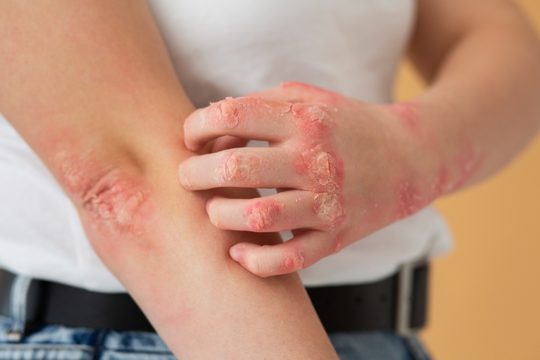
So, it might take some time and patience to discover the most effective approach for your specific situation. Your healthcare provider can guide you through this process, providing recommendations based on your personal medical history, the severity of your symptoms, and any other health conditions you may have.
In addition to medical treatment, lifestyle changes like maintaining a healthy diet, managing stress, avoiding triggers, and protecting your skin can also play a significant role in managing psoriasis. Remember, while it may be challenging at times, it's entirely possible to live a fulfilling life with psoriasis. So, don't lose hope. Keep working with your healthcare provider, stay proactive in managing your condition, and above all, remember that you're not alone in this journey.
About us
Welcome to HealsHub! Your go-to source for all things related to health and wellness! We're here to help you lead a healthier, happier life by providing you with the latest news, research, and advice on topics like nutrition, fitness, mental health, and more. Our mission is to empower you to take control of your health and well-being through education and inspiration. Whether you're looking to lose weight, build muscle, manage stress, or simply learn more about how your body works, you'll find everything you need right here on healshub.com. We believe that everyone deserves to live a healthy, fulfilling life, and we're committed to providing you with the tools and resources you need to achieve your goals. So take a look around, explore our articles and resources, and start your journey towards better health today!

